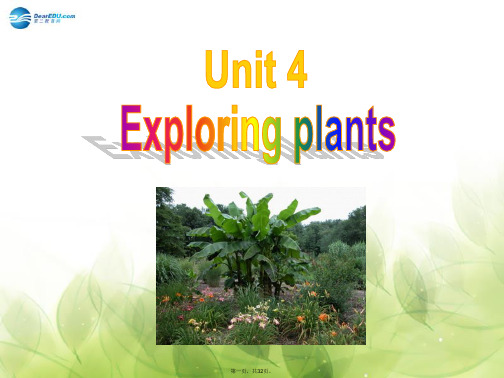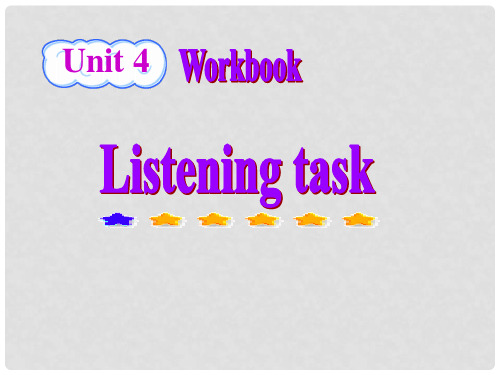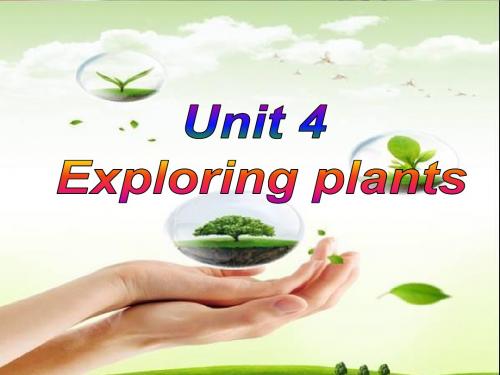高中英语Unit 4 Exploring plants-reading人教版必修9
高中英语 Unit4Exploring plants-Writing课件 新人教选修9

h
6
Third listening
Listen to the first part again and complete the table of conditions that each dish of seeds was given.
h
7
Conditions
Dish A tap water, warm temperature,
TH: Right, let’s talk about what’s
happened in our experiment. What
are the results? Andrew?
A: The seeds in Dish A have started
growing but none of the others have.
3
1
5
4
2
h
3
Listen to the first part again and answer the questions.
1. What is the purpose of the experiment? 2. To find out three important
conditions that seeds need in order to start growing.
h
9
Did the Reasons why or seeds grow? why not
Yes Dish A
Dish B
No
Because they had water, warmth and oxygen.
Because it was too cold.
h
10
Did the Reasons why or why not
高中英语 Unit 4 Exploring plants Warming up课件 新人教版选修9

第二十四页,共32页。
Dr Nathaniel Ward’s invention
第二十五页,共32页。
The Wardian case
第二十六页,共32页。
Robert Fortune (1812-1880)
第二十七页,共32页。
Robert Fortune
A Scottish botanist and traveller known for introducing tea plants from China to India. Through his use of the Wardian case, Fortune was able to introduce many of the best-known Chinese garden plants into cultivation in Europe and North America.
Sir Joseph Banks
(1743 –1820)
an English naturalist, botanist and patron of the natural sciences. He took part in Captain James Cook's first great voyage (1768–1771).
第九页,共32页。
sunflower 向日葵
第十页,共32页。
Rose
Roses are best presents to be sent to friends. And it is also very popular to send roses as love signal between young people. Red roses indicate warmth and love and white ones, purity and simplicity, blue ones, honesty and sincerity.
人教版高中英语选修九Unit4《Exploringplants》Writing课件(1)(新)

Did the Reasons why or seeds grow? why not
Yes Dish A
Dish B
No
Because they had water, warmth and oxygen.
Because it was too cold.
Did the Reasons why or why not
Procedure: 1.Put the pieces of cloth on the dishes. Spread the seeds on the cloth. Label the dishes A to D. 2. Take Dish A and wet the cloth with tap water and place it in a well-aired warm spot—so by the window over there would be fine. 3. Take Dish B, wet it with tap water and put it in the fridge.
TH:Very good. Now I want you all to write up the experiment in your science notebook.
Writing task
When writing an experiment report, you can ask questions about: ● the position of the headings, what the headings are, their order: ● how the items in the “materials” section are presented (as a list);
高中英语 Unit 4 Exploring plants Workbook listening and writing课件 新人教版选修9

LISTENING TEXT
An experiment on plants Part1: Listen to a teacher (TH) helping
One: Put the pieces of cloth on the dishes and spread the seeds on the cloth. Label the dishes A to D.
Two: Take Dish A and wet the cloth with tap water and place it in a wellaired warm spot– so by the window over there would be fine.
3 Listen to the first part again and complete the table of conditions that each dish of seeds was given.
Dish A Dish B Dish C Dish D
Conditions
tap water, warm temperature, oxygen tap water, cold temperature, oxygen no water, warm temperature, oxygen boiled water, oil, warm temperature, no oxygen
Unit 4
1 Listen to the first part of the tape in which a teacher ids helping her class set up an experiment. Number the pictures in the order you hear about them.
人教版高中英语选修9课件:Unit 4 Exploring plants Learning about language(共17张PPT)

After three months at sea, we finally arrived and lowered the _a_n_c_h_o_r_ in the harbour of our destination. We were dirty and had long beards, for we had no fresh water to wash in and we didn’t _s_h_a_v_e_ at all. What a sight we were!
6) I will report them the kind of monument we are planntoing to build for the soldiers.
1. Retell the story to your partner. 2.2. Finish off the exercises in your
3) Jim and Mandy both denied _h_a_v_in_g__s_e_e_n_/_s_e_e_in_g__t_h_e_c_a_r_k_e_y_s__. (see / car key)
4) I expect _to__s_p_e_n_d_m__y_h__o_li_d_a_y_s_i_n_F_r_a_n_c_e this year. (spend / holidays / France)
2021-2022高中英语Unit4Exploringplants单元重点小结课件新人教版选修9

点 语
2.I expect 我盼望着今年去巴黎度假。
法
3.They enjoyed 他们喜欢分享他们的工作体会。
in France this year. .
4.Do you think
?
你认为广告以某种方式影响你的生活了吗?
Expressing emotions(表达情感)
交 际 功 能
1.Wonderful!很棒! 2.Disgust!糟糕! 3.That’s amazing!令人吃惊! 4.How interesting!多么有趣呀! 5.Wow!哇!
India,where a successful tea industry was established.
福琼不仅把 120 余种植物引入西方园林,而且还把两万株茶树用船从上海
运到了印度,印度的制茶工业就成功地建立起来了。
复习宾语
1.We should respect
.
重 我们应尊重老人,关心小孩。
•
13、知人者智,自知者明。胜人者有 力,自 胜者强 。2021/4/182021/4/182021/4/182021/4/184/18/2021
•
14、意志坚强的人能把世界放在手中 像泥块 一样任 意揉捏 。2021年4月18日星期 日2021/4/182021/4/182021/4/18
•
15、最具挑战性的挑战莫过于提升自 我。。2021年4月2021/4/182021/4/182021/4/184/18/2021
•
16、业余生活要有意义,不要越轨。2021/4/182021/4/18Apr il 18, 2021
•
17、一个人即使已登上顶峰,也仍要 自强不 息。2021/4/182021/4/182021/4/182021/4/18
新课标高中英语Unit4ExploringplantsReading课件选修九
Dove Tree
Ernest Henry Wilson (1876 - 1930)
Scan the title of the reading passage and the pictures and predict what it is about?
Then
When: between 1843 and 1859
Who: Robert Fortune
What: He not only introduce _1_2_0_ _sp_e_c_i_e_s_o_f_p_l_a_n_t_s to _w_e_s_te_r_n _g_a_r_d_e_n_ but he also shipped _te_a__p_la_n_t_s_ from _S_h_a_n_g_h_a_i__ to_I_n_d_i_a__
f. collected vast quantities of plants in Australia
Detailed reading:
Try to get the main idea of each paragraph:
Para 1: explains when plant collecting began. Para 2: describes when and where plant
collecting plants
When: By the middle of the 18th century
Who: French Catholic missionaries
What:
Father d’Incarville was sent to _B__ei_j_in_g_ to c_o_l_le_c_te_d__s_ee_d_s_ of trees and bushes including those of the _T_r_e_e of__H_e_av_e_n___
高中英语新课标(人教版选修9)课件+Unit+4+Exploring+plants+Writing+课件+选修九+(1)+Word版含解析
boiled water and some cooking oil.
Third listening
Listen to the first part again and
complete the table of conditions that each
dish of seeds was given.
Conditions
Dish A tap water, warm temperature, oxygen Dish B tap water, cold temperature, oxygen Dish C no water, warm temperature, oxygen Dish D boiled water, oil, warm temperature, no oxygen
● what the “procedure” tells you (the steps you carry out to set up the experiment); ● the grammatical structures used for each section of the report.
On the bench.
4. What materials do the students need to set up the experiment? Four dishes and four pieces of cloth, a dish of seeds, some tap water, some
Fourth listening
Now listen to the second part of the
tape in which the class discusses the
高中英语 Unit4Exploring plants-Writing课件 新人教选修9 公开课精品课件
seeds
grow?
Dish C
No
Because they didn’t get any water.
Because they were watered
Dish D
No
with boiled water which has no oxygen. Also, they were
covered with oil which
prevented oxygen getting
to the seeds.
Listen to the second part of the tape again and discuss the question:
What was the conclusion of the experiment?
Seeds need warmth, water and oxygen to grow.
Dish B tap water, cold temperature, oxygen
Dish C no water, warm temperature, oxygen
Dish D boiled water, oil, warm temperature, no oxygen
Fourth listening Now listen to the second part of the tape in which the class discusses the results of the experiment. Complete the table of results.
LISTENING TEXT
An experiment on plants Part1: Listen to a teacher(TH) helping
【最新】高中英语新课标(人教版选修9)课件+Unit+4+Exploring+plants+Writing+课件
Number the pictures in the order you hear about them. 3 1 5
4
2
Listen to the first part again and answer the questions.
1. What is the purpose of the experiment? To find out three important conditions that seeds need in order to start growing.
Listen to the second part of the tape again and discuss the question: What was the conclusion of the experiment? Seeds need warmth, water and oxygen to grow.
Outline Aim: To find out three important conditions that seeds need in order to start growing. Materials: 1. four dishes
A
B
C
D
2. four pieces of cloth
3. some boiled water 4. some tap water 5. a dish of seeds 6. some cooking oil
● what the “procedure” tells you (the steps you carry out to set up the experiment); ● the grammatical structures used for each section of the report.
- 1、下载文档前请自行甄别文档内容的完整性,平台不提供额外的编辑、内容补充、找答案等附加服务。
- 2、"仅部分预览"的文档,不可在线预览部分如存在完整性等问题,可反馈申请退款(可完整预览的文档不适用该条件!)。
- 3、如文档侵犯您的权益,请联系客服反馈,我们会尽快为您处理(人工客服工作时间:9:00-18:30)。
Unit 4 Exploring plants-reading Part One: Teaching Design Period 1: A sample lesson plan for reading (PLANT EXPLORATION IN THE 18TH AND 19TH CENTURIES) Aims To help students develop their reading ability To help students learn exploring plants Procedures ■Warming up by defining plants Plants are a major group of living things (about 300,000 species), including familiar organisms such as trees, flowers, herbs, and ferns. Aristotle divided all living things between plants, which generally do not move or have sensory organs, and animals. In Linnaeus' system, these became the Kingdoms Vegetabilia (later Plantae) and Animalia. Since then, it has become clear that the Plantae as originally defined included several unrelated groups, and the fungi and several groups of algae were removed to new kingdoms. However, these are still often considered plants in many contexts. Indeed, any attempt to match "plant" with a single taxon is doomed to fail, because plant is a vaguely defined concept unrelated to the presumed phylogenic concepts on which modern taxonomy is based. Warming up by talking about different gardens Gardens vary in forms and functions. How many can you see in your area? Gardens may function in a particular manner Botanical garden, Community garden, Forest garden, Raised bed gardening, Residential garden, Roof garden, Vertical garden, Water or soil-less gardening (hydroponics) , Walled garden, Windowbox, Zoological garden ■Warming up by discussing gardening Gardening is the activity of growing and maintaining the garden. This work is done by an amateur or professional gardener. A gardener might also work in a non-garden setting, such as a park, a roadside embankment, or other public space. Landscape architecture is a related professional activity with landscape architects tending to specialise in design for public and corporate clients. I. Pre-reading What is a garden? A garden is a planned space, usually outdoors, set aside for the display, cultivation, and enjoyment of plants and other forms of nature. The garden can incorporate both natural and man-made materials. The most common form is known as a residential garden. Western gardens are almost universally based around plants. Zoos, which display wild animals in simulated natural habitats, were formerly called zoölogical gardens. Some traditional types of eastern gardens, such as Zen gardens, use plants sparsely or not at all. Food-producing gardens are distinguished from farms by their smaller scale, more labor-intensive methods, and their purpose (enjoyment of a hobby rather than produce for sale); this distinction is not always clear-cut, however. The gardening article discusses the differences and similarities between gardens and farms in greater detail. Gardening is the activity of growing and maintaining the garden. This work is done by an amateur or professional gardener. A gardener might also work in a non-garden setting, such as a park, a roadside embankment, or other public space. Landscape architecture is a related professional activity with landscape architects tending to specialise in design for public and corporate clients. II. Reading for forms Read the text PLANT EXPLORATION IN THE 18TH AND 19TH CENTURIES to: cut/ the sentence into thought groups, blacken the predicative, darken the connectives and underline all the useful expressions. PLANT EXPLORATION IN THE 18TH AND 19TH CENTURIES The plants /in our gardens/ look so familiar/ that often we do not realize that /many of them actually come from countries/ far away.Collecting“exotic”plants,as they are called,dates back to the earliest times.Many ancient civilizations saw the value of bringing back plants /from distant lands.The first plant collecting expedition /recorded in history was around 1500 BC /when the Queen of Egypt sent ships away to gather plants,animals /and other goods. However,it was not until the eighteenth/ and nineteenth centuries /that the exploration of the botanical world began on a large scale.Europe had become interested in scientific discovery/ and the European middle classes took great interest in collecting new plants.This attraction /to exotic plants grew as European nations,like the Netherlands,Britain/ and Spain,moved into other parts of the world/ like Asia /and Australia.Brave young men took the opportunity of going on botanical expeditions,often facing many dangers/ including disease, near-starvation,severe environments/ and conflicts with the local people.
